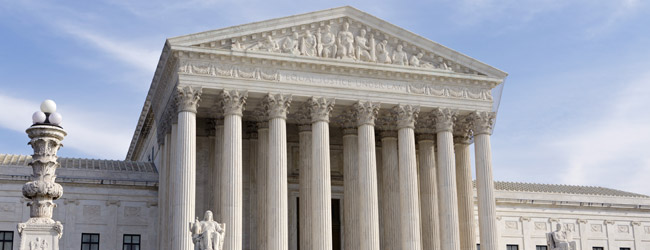A new Supreme Court case involving the University of Texas has gained national attention for its potential implications on racial identity as a determining factor in college admissions.
Abigail Fisher, a white student who claims the University of Texas at Austin denied her admission due to her race in 2008, is the primary plaintiff suing the university. The other is Rachel Michalewicz, another white student.
The University of Texas system admission policy automatically admits students who finish high school in the top 10 percent of their class, although there is a partial exemption at the Austin campus to limit that automatic-admittance to 75 percent of the incoming class. For those who aren’t in that top bracket, race is taken into consideration in an effort to diversify its incoming classes.
Fisher and Michalewicz were both denied admission and claim that the university’s race-conscious admission policy violated their civil and constitutional rights. They argue that if they were any race but white they would have been admitted to the university and attended that fall as freshmen. Both students were enrolled in Texas high schools at the time.
“I hope the (Supreme) Court will decide that all future University of Texas applicants will be allowed to compete for admission without their race or ethnicity being a factor,” Fisher said in a statement issued by the Project on Fair Representation, a foundation based in Washington that opposes race-conscious government actions.
Bill Powers, president of the University of Texas at Austin, defended the university in a public statement regarding the U.S. Supreme Court hearing and the university’s admissions policy.
“We have a holistic admissions process that helps us serve all of the populations of the state of Texas,” Powers said. “It is very narrowly tailored and follows previous statements by the (Supreme Court) on how an admissions process meets our constitutional requirements, and we will continue to make those points as we proceed with this litigation and best serve the people of Texas.”
Paul Nolette, a professor of political science in the College of Arts & Sciences, had students in his “Civil Rights and Liberties” class read the case brief and hold a mock trial about the case, which is similar to a 2003 ruling on affirmative action. He said a big reason why this case is being revisited in the Supreme Court is because of the Court’s newer justices.
“One reason why this change is because the membership of the court has shifted dramatically and there are four new members,” Nolette said. “In the past the court has been fairly preferential, accepting affirmative action at the university level. But because of all of the changes in the court, it has opened the door for the court to look at these types of affirmative action programs more skeptically.”
In 2009, U.S. District Judge Sam Sparks from Austin chose to uphold the university’s policy. Sparks ruled that the admissions policy is carefully constructed to serve the government’s interest in diversity. Two years later in 2011, a panel of three judges in the 5th U.S. Circuit of Court Appeals in New Orleans unanimously agreed with Sparks’ decision.
In the 2003 case, Barbara Grutter, a white female, was denied admission to the University of Michigan’s Law School based on her race. The law school had a specific admissions policy that looked to promote diversity in the university. The university argued the policy was in place to ensure students from minority groups — specifically, African-Americans and Hispanics — were well represented in the student body.
The Supreme Court majority ruling, authored by Justice Sandra Day O’Connor, said the United States Constitution “does not prohibit the law school’s narrowly tailored use of race in admissions decisions to further a compelling interest in obtaining the educational benefits that flow from a diverse student body.”
O’Connor hoped that at some point in the future, racial affirmative action would not be necessary when diversity needed to be promoted, but the Grutter case is facing scrutiny after a 2007 ruling that forbade public schools from promoting diversity through race-conscious student-assignment plans. The opinion for that case was authored by O’Connor’s successor, Justice Samuel Alito.
Marquette could never be sued for allowing affirmative action in its admission policies because it is a private organization that is not affiliated with governmental decisions, sanctioned by the government or specified by in the Bill of Rights and the rest of the Constitution.
The University of Texas has asked the justices to ignore the case and argued that the claim was not contestable because both Fisher and Michalewicz had moved on and are attending other universities. Fisher is seeking the abolition of the policy and $100 in damages to cover her application fee and housing deposit.
Nolette said the case might not make college admissions any simpler.
“If I’m going to make a prediction, the court will muddy the waters even more because there have been a line of cases since 1978 where the courts come back time and time again to the issue of affirmative action,” Nolette said. “(There) has never really been a clear handle on how it wants to treat affirmative actions in terms of the Constitution.”
The case is likely to be heard in the 2012-13 term, which starts in October.

